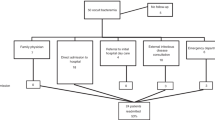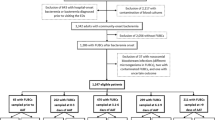Abstract
The purpose of this investigation was to elucidate the impact of prompt intervention for patients whose blood culture results became positive during weekends, as this is not standard care in some countries. A retrospective cohort study was conducted in a tertiary referral hospital. From June 2015, results of positive blood cultures became available during weekends. If infectious disease specialists identified cases of bacteremia on suboptimal antimicrobial coverage, they contacted the primary team for modification of antibiotic treatment. We reviewed patients whose blood culture results became positive during weekends, comparing the pre-intervention (September 2014 to May 2015) and post-intervention (June 2015 to February 2016) periods. In total, 1081 (post-intervention 568 [52.5%]) bacteremia episodes were included (median patient age [interquartile range, IQR]: 72 [60–82] years; men: 625 [57.8%]). During the post-intervention period, 187 (32.9%) bacteremia episodes were detected during weekends. Infectious disease specialists evaluated the positive blood culture results 1, 2, and ≥3 days prior in 77 (13.6%), 88 (15.5%), and 22 (3.9%) cases, respectively. Although the 7- and 30-day mortality did not significantly improve after the intervention, the length of hospital stay (LOS) in the hospital-acquired bacteremia group was significantly reduced during the post-intervention period after controlling for confounders (post- vs. pre-intervention: median days [IQR]: 37 [19–63] vs. 46.5 [24.8–86.3], p = 0.030). Blood culture results became positive during weekends in one-third of bacteremia cases. The LOS was shortened after the intervention in the hospital-acquired bacteremia group. This could be an important antimicrobial stewardship target.


Similar content being viewed by others
References
Wisplinghoff H, Bischoff T, Tallent SM, Seifert H, Wenzel RP, Edmond MB (2004) Nosocomial bloodstream infections in US hospitals: analysis of 24,179 cases from a prospective nationwide surveillance study. Clin Infect Dis 39:309–317
Kumar A, Ellis P, Arabi Y et al (2009) Initiation of inappropriate antimicrobial therapy results in a fivefold reduction of survival in human septic shock. Chest 136:1237–1248
Fraser A, Paul M, Almanasreh N et al (2006) Benefit of appropriate empirical antibiotic treatment: thirty-day mortality and duration of hospital stay. Am J Med 119:970–976
Kang CI, Kim SH, Park WB et al (2005) Bloodstream infections caused by antibiotic-resistant gram-negative bacilli: risk factors for mortality and impact of inappropriate initial antimicrobial therapy on outcome. Antimicrob Agents Chemother 49:760–766
Barlam TF, Cosgrove SE, Abbo LM et al (2016) Implementing an antibiotic stewardship program: guidelines by the Infectious Diseases Society of America and the Society for Healthcare Epidemiology of America. Clin Infect Dis 62:e51–e77
Bell CM, Redelmeier DA (2001) Mortality among patients admitted to hospitals on weekends as compared with weekdays. N Engl J Med 345:663–638
Laupland KB, Kibsey PC, Galbraith JC (2012) Community-onset bloodstream infection during the ‘after hours’ is not associated with an increased risk for death. Can J Infect Dis Med Microbiol 23:170–172
Cram P, Hillis SL, Barnett M, Rosenthal GE (2004) Effects of weekend admission and hospital teaching status on in-hospital mortality. Am J Med 117:151–157
Marco J, Barba R, Plaza S, Losa JE, Canora J, Zapatero A (2010) Analysis of the mortality of patients admitted to internal medicine wards over the weekend. Am J Med Qual 25:312–318
Clinical and Laboratory Standards Institute (CLSI) (2012) Performance standards for antimicrobial susceptibility testing; Twenty-second informational supplement. Approved standard M100-S22. CLSI, Wayne, PA
Pien BC, Sundaram P, Raoof N et al (2010) The clinical and prognostic importance of positive blood cultures in adults. Am J Med 123:819–828
Friedman ND, Kaye KS, Stout JE et al (2002) Health care-associated bloodstream infections in adults: a reason to change the accepted definition of community-acquired infections. Ann Intern Med 137:791–797
Bai AD, Showler A, Burry L et al (2015) Impact of infectious disease consultation on quality of care, mortality, and length of stay in Staphylococcus aureus bacteremia: results from a large multicenter cohort study. Clin Infect Dis 60:1451–1461
Holland TL, Arnold C, Fowler VG Jr (2014) Clinical management of Staphylococcus aureus bacteremia: a review. JAMA 312:1330–1341
Honda H, Krauss MJ, Jones JC, Olsen MA, Warren DK (2010) The value of infectious diseases consultation in Staphylococcus aureus bacteremia. Am J Med 123:631–637
Pastagia M, Kleinman LC, Lacerda de la Cruz EG, Jenkins SG (2012) Predicting risk for death from MRSA bacteremia. Emerg Infect Dis 18:1072–1080
Rieg S, Peyerl-Hoffmann G, de With K et al (2009) Mortality of S. aureus bacteremia and infectious diseases specialist consultation—a study of 521 patients in Germany. J Infect 59:232–239
Tissot F, Calandra T, Prod’hom G et al (2014) Mandatory infectious diseases consultation for MRSA bacteremia is associated with reduced mortality. J Infect 69:226–234
Acknowledgments
The authors thank all the clinical staff of the Disease Control and Prevention Center and Clinical laboratory for their help in the completion of this study.
Author information
Authors and Affiliations
Corresponding authors
Ethics declarations
Funding
This work was supported by Grants for International Health Research from the Ministry of Health Labor and Welfare of Japan (26S-120) and Grants-in Aid for Research from the National Center for Global Health and Medicine (26A201).
Conflict of interest
The authors declare no conflict of interest.
Ethical approval
This study was approved by the Human Research Ethics Committee of NCGM (NCGM-G-001131-02) prior to its initiation.
Informed consent
The need for informed consent was waived by the Human Research Ethics Committee of NCGM due to the retrospective nature of the analysis using information contained in medical charts and records, which were anonymized.
Rights and permissions
About this article
Cite this article
Tsuboi, M., Hayakawa, K., Mezaki, K. et al. Impact of prompt intervention in response to positive blood culture results during weekends by collaboration between infectious disease specialists and microbiology laboratory staff. Eur J Clin Microbiol Infect Dis 36, 1889–1897 (2017). https://doi.org/10.1007/s10096-017-3009-5
Received:
Accepted:
Published:
Issue Date:
DOI: https://doi.org/10.1007/s10096-017-3009-5




